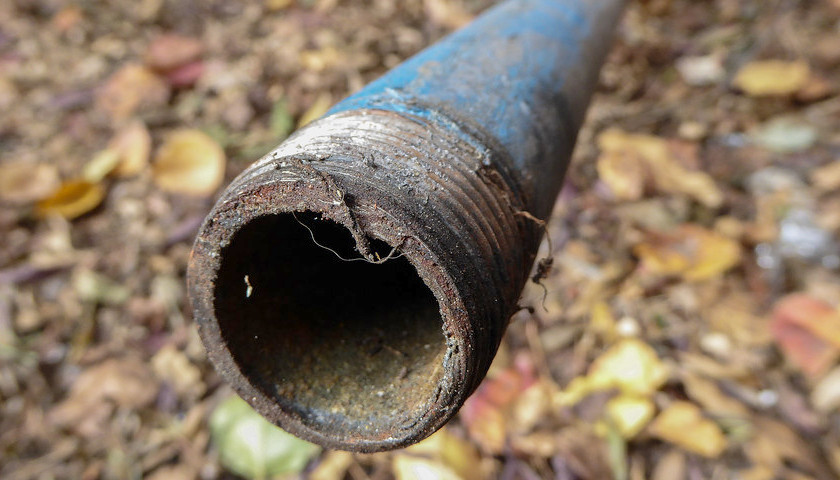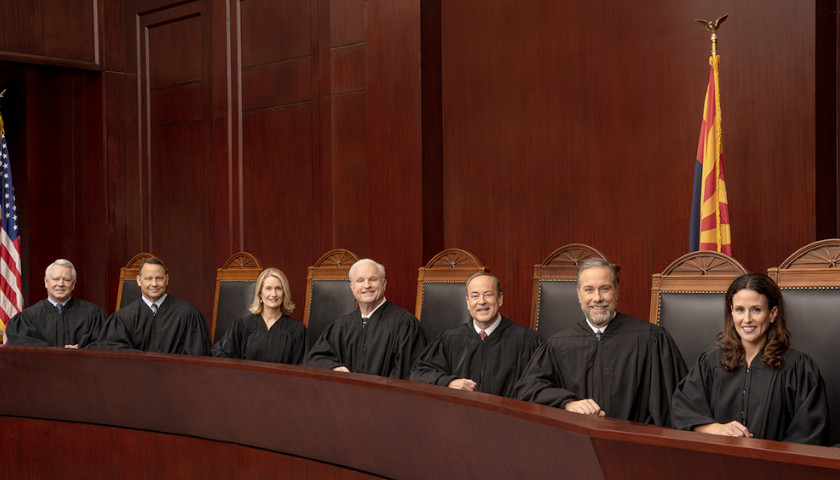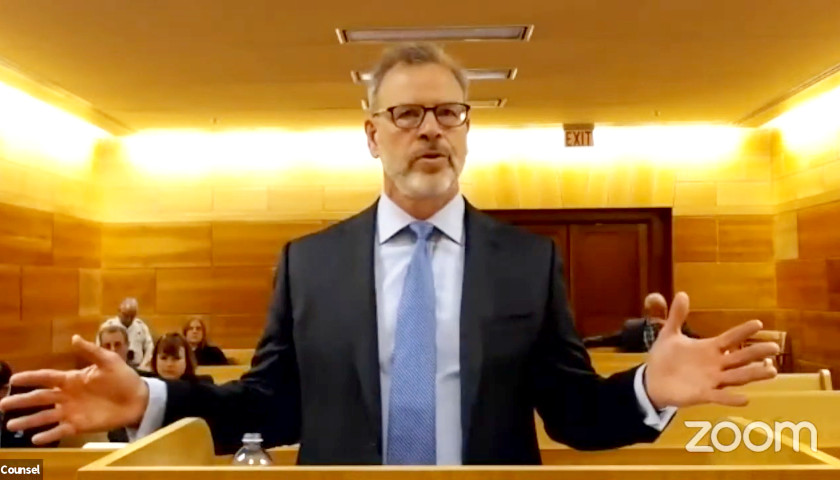For the last year and a half, a group of individuals in Arizona have been investigating the lack of accreditation of the laboratories that certify voting machine readers used in Arizona. Concerned that the machines are susceptible to manipulation — not just fully electronic voting machines but also electronic voting machine readers that are used with paper ballots here in Arizona — the group has made several unsuccessful attempts to get the courts to acknowledge the discrepancy, as well as calling upon elected officials in the state’s executive and legislative branches for assistance.
The group is currently represented by three members: Daniel Wood, Brian Steiner, and Paul Rice. Wood told The Arizona Sun Times, “Because the laboratories weren’t accredited, and the state didn’t adhere to the law, our election due process rights have been and are being violated. We would like to see ballots counted by hand instead of machine tabulation for the November election. If France, a country of 65 million people, can successfully count ballots by hand in its presidential election last April, a few counties in Arizona can do it.”
Electronic voting machines became commonly used after the disastrous 2000 presidential election, which left the winner unknown for days after the election due to “hanging chads” on the punch card paper ballots. In response, Congress passed the Help America Vote Act (HAVA), which created incentives for states to switch to electronic voting machines. HAVA also formed the Election Assistance Commission (EAC) which was tasked with developing a set of standards participating states are required to follow. Two of those standards, “accreditation” and “certification,” are of particular importance. Accreditation is the act of verifying a company as meeting all official formal requirements of excellence, competency, integrity, and performance. The law assigns sole responsibility to the EAC for the accreditation of any company that “certifies” the integrity of electronic voting machines used in our elections.
By examining the certifications of electronic voting machines, the group has investigated whether voting machines across the country and in Arizona’s 15 counties were compliant with the EAC’s requirements. They found that approximately half of the states, including Arizona, have adopted the HAVA provision that requires all electronic voting machines to be certified by an accredited Voting System Test Laboratory (VSTL), but they are not in compliance. This is significant, they say, because once properly accredited, the VSTL has demonstrated it is free from foreign influence and conflicts of interest, is financially stable, maintains adequate records, and is technically competent to evaluate the integrity of the election voting machines.
Although the machines had certificates issued stating they were compliant, the group asserts they were not valid. The VSTL accreditations had expired prior to the 2020 election. They were also signed by the EAC director, not the EAC commissioner as required by law.
The group found no legal avenue that would allow election officials to waive the lack of accreditation. Instead, they found excuses by the EAC. Since the 2020 election, the group has regularly checked the EAC website and state records where the certificates of accreditation are posted, and observed various discrepancies, such as new documents with no date stamps, references to accreditation documents that aren’t on the site, claims of administrative errors, and using COVID-19 as an excuse for discrepancies before COVID-19 had emerged. The certificates were placed on the site “without following due diligence and compliance rules.”
The group filed five pro se elector due process related special writs in the Arizona Supreme Court against Hobbs and various other officials. They asserted there was a violation of A.R.S. I6-442(B), which provides, “Machines or devices used at any election for federal, state or county offices may only be certified for use in this state and may only be used in this state if they comply with the help America vote act of 2002 and if those machines or devices have been tested and approved by a laboratory that is accredited pursuant to the help America vote act of 2002.”
The group also pointed out further potential civil rights violations involving the First and Fourteenth Amendment rights. A.R.S. 16-609(A) states, “Only ballots that are provided in accordance with the provisions of law shall be counted.” The group notes that the Arizona Constitution states that candidates win elections based on “the highest number of legal votes.” (emphasis added)
Rice told The Sun Times, “The reason the accreditation is so important is because it was put in place as a security measure, like a firewall, to minimize the risk of vote manipulation.” A.R.S. 16-625 provides, “The officer in charge of elections shall ensure that electronic data from and electronic or digital images of ballots are protected from physical and electronic access, including unauthorized copying or transfer, and that all security measures are at least as protective as those prescribed for paper ballots.”
They pointed out that Hobbs previously stated she is concerned about lack of certifications in the ballot tabulation process in a letter she sent to former Arizona Secretary of State Ken Bennett while he served as the liaison between the Arizona Senate and the independent ballot audit of the 2020 presidential election. She said,
While Arizona law requires that voting systems, including components that capture ballot images, must be tested by a federal Voting System Testing Laboratory (VSTL), including for accuracy, reliability, and security, and certified by the federal Election Assistance Commission (EAC) and my Office, the hardware and software supplied by Cyber Ninjas to capture and display the ballot images in this counting process are untested and uncertified. This fact raises serious concerns because it means the systems used have not been tested or certified to ensure, for example, that the system is not preloaded with inaccurate ballot images or that the system’s software is not written to manipulate specific images of scanned ballots. Testing and certification by federal and state authorities is designed specifically to protect against such risks, including through a thorough source code review to ensure these risks cannot occur.
Finally, the group asserted in their writs, “We do not seek to ‘overturn’ or ‘contest’ an election.” However, they believe the county and state elected officials who received certificates of election after winning their respective races hold invalid, unlawful certificates.
The Arizona Supreme Court dismissed the first four cases for lack of jurisdiction. When the group asked the court for direction on what jurisdiction would accept the writs, they received no response, which they claim is a violation of law. A.R.S. 12-120.22(B) states, “No case, appeal or petition for a writ brought in the supreme court or court of appeals shall be dismissed for the reason only that it was not brought in the proper court or division, but it shall be transferred to the proper court or division.”
Justice Ann Timmer stated in one of the dismissals that the writ wasn’t timely due to A.R.S. 16-673(A), which provides, “The elector contesting a state election shall, within five days after completion of the canvass of the election and declaration of the result thereof by the secretary of state or by the governor, file in the court in which the contest is commenced a statement in writing setting forth…[list of items]”
However, Wood pointed out to The Sun Times, “This reasoning provides no remedy for malfeasance found more than five days after a canvass; no way to correct previous wrongs or prevent future wrongs from happening again. And the court is holding us pro se plaintiffs up to a high standard for timing but not our publicly elected official Hobbs. Hobbs has had two years to respond to HAVA. But the court chooses to uphold a burdensome law which violates our Electoral Due Process under the 14th Amendment.”
Timmer focused on the aspect of the writ which said officeholders had invalid certificates of election, citing Chavez v. Brewer, which held that “nothing in the statutes Petitioners cite grants them a private right of action to remove office holders.”
Steiner told The Sun Times it wasn’t necessary for her to go there, “Our writs weren’t about removing officeholders. Why isn’t the court addressing the violation of law? She could have just ruled on the substantive issue of due process of whether the certificates weren’t adequate. It sounds like she was looking for a pretext to throw the writ out.”
A 2018 article in the Duke Law Journal by Sarah Milkovich, which analyzed the problems with electronic voting machines, explained why efforts to curtail their use have been unsuccessful. “While each state has developed a unique election-challenge process, the majority are structured to restrict the number of challenges, to impose short timelines on election challengers, and to minimize the number of challenges that ultimately succeed,” she said. Milkovich believes “at a certain point, such procedures burden voters’ constitutional rights,” particularly electoral due process.
The group expressed their frustration at trying to find an attorney to represent them, since no attorneys in Arizona dare to speak out on this issue due to the reputation the Arizona State Bar has for coming after attorneys championing issues associated with the right, including issues related to the 2020 election.
Rice told The Sun Times, “Our experience in the fight for electoral due process is a classic example of why efforts to deal with maladministration and misrepresentation in our elections go nowhere in the legal system.”
In a petition to the Arizona Legislature, the group called for Hobbs to be impeached due to signing off on “certified” voting machines “that were not compliant or lawful to be used for any election in Arizona due to no lab accreditation.” They sent their concerns to every member of the legislature, Gov. Doug Ducey’s attorney, and Arizona Attorney General Mark Brnovich’s office but received no responses.
For a solution, the group agrees with the effort started by Arizona Corporation Commissioner Jim O’Connor to convince county election officials to refrain from using electronic voting machine readers in the Nov. 8 election. They point out that each county has a contingency plan already in place that likely requires hand counting, since the Election Procedures Manual requires a contingency plan in the event “the county experiences a complete loss of its central count equipment or use of its central counting place.”
– – –
Rachel Alexander is a reporter at The Arizona Sun Times and The Star News Network. Follow Rachel on Twitter. Email tips to [email protected].
Photo “Voting Machine” by uacescomm. CC BY-NC-SA 2.0.








